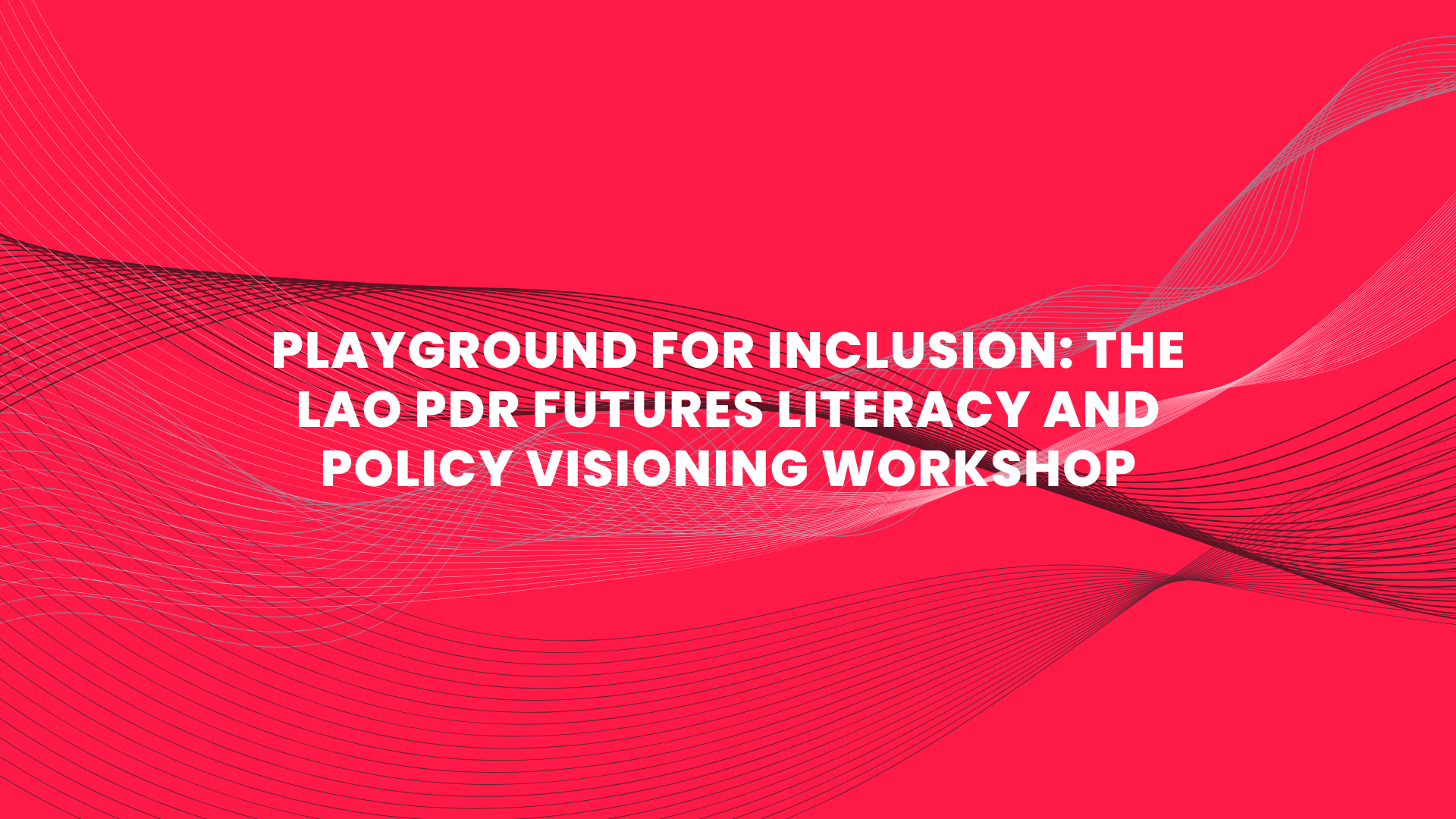
Playground for Inclusion: The LAO PDR Futures Literacy and Policy Visioning Workshop

“If you want to change or transform world, you have to ask better questions”
UNESCO Bangkok in partnership with the Center for Engaged Foresight organized a workshop on Data Analysis and Youth Policy Development in LAO PDR. The Futures Literacy and Policy Visioning Workshop was facilitated by the Center for Engaged Foresight with UNESCO.
This briefly presents the preferred futures, visions and priorities that resulted from a two-day futures literacy/policy visioning (FL) workshop for the Lao People’s Revolutionary Youth Union (LYU) held at the LYU’s headquarters in Vientiane Capital, Lao PDR.
The workshop introduced and integrated futures literacy (FL) to UNESCO’s youth policy development for LAO PDR. The participants learned and used the future by employing select anticipatory tools and methods to question, explore, anticipate, imagine and design preferred youth policy visions on five thematic areas: education, health, employment, protection and participation. The methods used includes experiential questioning and shared history, futures wheel analysis, HMW (how might we) point of view statements for brainstorming, futures triangle, scenarios, designing prototypes and policy identification/prioritization tools.
The workshop concluded with five preferred future visions and prototypes including initial policy priorities complimenting LYU’s national youth development agenda, UNESCO’s Guidance Framework for Youth Policy Development and Agenda for Mainstreaming Gender Equality and Social Inclusion into Youth Policies: 1) Playground for Inclusion Aka Playground for Kids (Participation); 2) My Home: Call 1-4-5-4 (Protection); 3) Happy Health, Easy App (Health); 4) Just Click! (Employment); 5) Digital Learning for Kids and Inclusion in Laos (Education).
Context and Methodology
What are Lao youth hopes and fears? What are they struggling with? What are their needs? What does the future mean to them? What are their images of the future? What are their future visions? How might a preferred future of employment, health, education, participation and protection look like to a Lao youth? How might they articulate their envisioned futures? What are the steps they can take to achieve their preferred visions of the future?
These questions among others were explored during the futures literacy (FL) and policy visioning workshop organized by UNESCO Bangkok in collaboration with the Lao People’s Revolutionary Youth Union (LYU) and the Asian Development Bank (ADB) to explore, discuss and shape Lao Youth futures/policy visions in five thematic areas: education, health, employment, protection and participation.
To ensure rigor and relevance in answering these questions, anticipatory processes and tools were used: 1) experiential questioning and shared history to deconstruct and explore the present and to remember the past; 2) futures wheel analysis to anticipate the implications and impacts of the current reality or the default future, continuing; 3) questioning the default future via short HMW (how might we) point of view statements for brainstorming opportunities and solutions; 4) the futures triangle to map the drivers and trends, the barriers that resist change and Lao youth future visions; 5) scenarios, to imagine and storify the future; 6) designing a prototype via co-creating proof of concepts of the envisioned futures and 7) the identification of specific actionable steps, feasible, doable policy priorities/programs to create the preferred future.
As a segment of the four-day workshop on Data Analysis and Youth Policy Development in Lao PDR, the futures literacy/policy visioning session sought to impart knowledge of key FL concepts, application of anticipatory techniques including demonstration of anticipatory processes to agenda setting and policy formulation. The FL – policy visioning workshop had these objectives:
- Train young participants on key FL concepts, anticipatory processes and application of futures tools and techniques;
- Make use of the future to anticipate, imagine and design preferred futures;
- Learn the basics of policy visioning and prioritization.
To meet these objectives, the engaged foresight (EF) method was employed. The EF method is a solutions-centric and simulation driven approach to futures thinking. The aim is to provoke in participants to question the future critically and to imagine possible, probable and preferred futures. Through creative action learning via prototypes, participants are expected to create a model, storify their envisioned futures. The building of prototypes enables creators to validate their ideas potential for real world application.
Imagining the Preferred and Co-Creating Prototypes
“your home will always be the place for which you feel the deepest affection, no matter who you are and where you are” and “home is where the heart is”
For this session, participants were asked to deliberate, to further imagine, create stories and develop prototypes of their plausible preferred futures of health, education, participation, employment and protection in Lao PDR. Leveraging from their outputs of the previous futures literacy sessions, participants were given guide questions to facilitate conversation: what do we want the future to be like? what is your plausible preferred future to the future of their assigned topics.
Shared Visions, Valuing Compassion and Proactive Engagement
“Investing in young people is investing in the future”
The future is awesomely bright for LAO PDR as young people are expected to play a greater role in shaping the futures of health, education, participation, employment and protection in Lao. The current focus and targets to provide young friendly services, the championing and integration of inclusion and diversity in government programs and initiatives, the acceptance and recognition of LGBTI, the PWDs, the disadvantaged and the marginalized, the capability training and up-skilling of youth leaders among others will in many ways impact how the Lao youth will address these challenges in the immediate future. As more young people are expected to engage in the years it is likely that they demand for greater participation and engagement. A critical turnaround could occur on how Lao society in general value young people’s ideas, opinions and leadership. These could be triggered by emerging digital and social technologies and network platforms that makes access to opportunities and social transformation engagements easier. The insights and output of the futures literacy and policy visioning workshop offered three critical insights crucial to the success of achieving Lao youth preferred futures and priorities in the short term:
1) A Shared Vision of the Future. What was obvious during the FL workshop and their outputs were the groups complimenting each other’s assumptions and envisioned futures. Their full protection, the observance of basic human rights, the need to recognize young people’s urgent needs and requirements, inclusion and diversity should be central to national youth policy development. Failure to recognize and realize these fundamental rights may lead to youth unhappiness, depression and suicide. If the youth is the future then all stakeholders must invest to ensure that young people issues and interests are championed at all levels. The shared vision preferred includes creating safe spaces to engage them in village and community decisions, to speak up without reservation and to listen with compassion. The awareness of the need to recognize that others have special needs and that each person is unique in terms of gender orientation, ethnicity, capacity and status, etc. must be acknowledged. Existing government services and future initiatives should recognize these differences. One of the group championed a multiple door policy or health service access to cater the needs and sensitivities of disadvantaged. Guaranteeing the access and equal opportunities for each sector are important. A shared vision energizes, it provides direction to current efforts, it is an inspiration that drives young people to work for a better and brighter future for all;
2) Valuing Compassion. Relentless compassion and relieving human suffering is key to creating alternative and preferred futures. Insight was for Lao youth, kindness and compassion is effective public policy. Compassion articulates, drives and attracts institutional buy-in. Lao youth are motivated by empathy and love. Compassion and love drives them to civic duty, to commit for public interest sake. They feel that they will succeed and will persist if there is compassion. The home was central to one of the groups envisioned future. The inner story felt like “your home will always be the place for which you feel the deepest affection, no matter who you are and where you are” and “home is where the heart is” was instructive. A group envisioned to establish “MyHome” centers in all the 148 districts in Lao PDR.
- Proactive Engagement. Where training ends, proactive engagement begins. Once the vision is set and priorities identified, LYU must develop a plan to convince end-users and policy stakeholders to opt-in. As champions, they must inspire adoption and bring in others – the rural village and communities – to the conversation. New futures require new metrics and development indicators. Building networks and sustaining partnerships will drive better outcome and sustainability is key in the long-run. Proactive engagement is an opportunity for LYU members to build stronger relationships. Timing and persistence is critical for a successful policy program.
